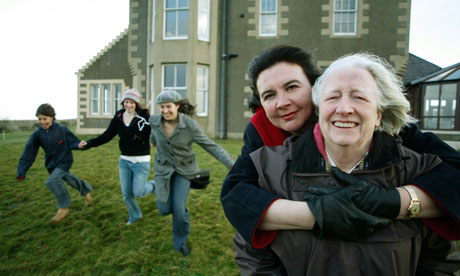
Behind the detailed breakdown of the global financial cost of dementia is the less well-documented human cost of every new diagnosis. Unusually, the World Alzheimer Report incorporates the cost of unpaid care by relatives into its calculation of the price of dementia globally, but there is no mechanism equipped to measure the misery that the condition unleashes on the individual and relatives.
Andrea Gillies, author of Keeper, a prize-winning account of caring for her mother-in-law, Nancy, as her Alzheimer's progressed, explains why dementia is a more devastating condition than other ageing-related illnesses.
"There's good reason why dementia has become the condition cited as most feared by people. Little by little, it invades the brain, making its slow and devastating progress, robbing us progressively of the ability to remember, to reason, to think, decide, imagine. For at least some of that time, sufferers are aware of their own diminishment, the lights going out one by one. We have arms and legs and we think we have brains, but the truth is that brains have us. The brain is where the self lives."
Gillies, pictured above with Nancy, bought a new house with her husband so that they could provide care at home, but their decision turned out to have been disastrously misguided.
"It isn't just about money: every diagnosis of dementia is likely to cause big life changes in the lives of half a dozen others. We moved with my in-laws to a house big enough for three generations, thinking that love would be enough, that it would cushion the progress of Alzheimer's. We misunderstood the disease."
In fact, it turned out that a family environment was the very worst thing for Nancy, in the end. She struggled every day with things that couldn't be true: that she was 80, a grandmother, had married, had retired; that the old man in the next chair was her husband.
"Brain damage made her into someone new, someone afraid and hostile," she says. "We spent two years living with Nancy and the emotional toll was enormous on all of us, Nancy included. Caring is a 24/7 vocation, respite and day centres notwithstanding, and in many cases the stark truth is that carers give up their own lives for the sake of someone they love. The starker truth is that many of them don't have any choice. 'Social care' is astronomically expensive.In all other cases of terminal disease than that of dementia, people don't have to sell their houses and give up most of their life savings to pay."
Clive Bowman, medical director of Bupa's care services, describes dementia as "the public health challenge of our time" and agrees that it is much more difficult for families to come to terms with than other complications that come with ageing. "When you sit down with someone who you have known for many years and they don't recognise you, that is upsetting; and when someone you know well doesn't know what to do with a favourite meal that you've prepared for them when placed before them, that's very distressing," he says.
Good dementia care requires well-trained staff, able to anticipate the needs of the sufferer, and Bowman calls for greater availability of high-quality care, as well as a system for registering all sufferers. "We are a way off from being able to say we are on top of this. There are still a large number of people who haven't been properly diagnosed and they just stumble from pillar to post, consuming inappropriate services ineffectively rather than getting good care and support efficiently. This is not acceptable and we should be doing much better."
Morejoy Saineti, a palliative care nurse, sees many families struggling to cope with the disease. "Slowly they lose their memory, their speech, their control of their bladder. You are losing the person while they are still alive, so the bereavement process is much longer than when a person dies of cancer. It is very distressing."
• This article was amended on 22 September 2010 to remove the names of Andrea Gillies' children from the photo caption, at her request. The original also referred to the title of her book as The Keeper. This has been corrected.

